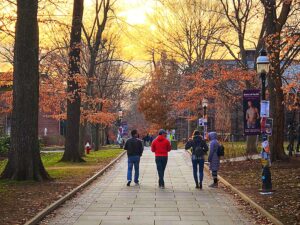The SAT is always evolving. From the scoring system to the content itself, the SAT undergoes a constant process in order to retain its status as the primary standardized test for college entrance. But what is the history of the SAT, and how did we get here, to the current version of the exam known as The Redesigned SAT?
To fully answer this question, we must look back in time to 1926, when Princeton professor Carl Campbell Brigham organized the first official SATs, or formally, Scholastic Aptitude Tests. These exams were based upon the Army Alpha/Beta test used in World War I and were intended to measure reasoning skills (as opposed to the more popular IQ tests of the time). They were first used by Columbia University, who decades before was already using essay exams administered by the College Board.
In the first edition of the exam, test-takers had just over an hour and a half to answer 315 questions; the mean exam score was 500 with a standard deviation of 100 and although unlikely, it was technically possible for students to score below a 200 and above an 800. In the next few years, the number of sections was reduced and the time limit was increased, and in 1928 and 1929 math was completely absent from the SAT. In 1930, the SAT was split into the math and verbal sections, and it remained this way for nearly 75 years. The math section was focused on speed and the questions were open ended, and the verbal section tested things like analogies, antonyms, and reading comprehension. From 1936-1941, the math section was again eliminated, and when it was re-added, the questions were all in multiple choice form.
It was around this time that the scoring system was altered to allow for the possibility of cross-year score comparisons, which was not previously possible since scores could vary depending on the average ability of SAT takers in a given year. In order to take such potential variations into account, all tests were equated to previous tests so that the same scores on different SATs would be comparable. This allowed mean scores to change over time, thus accurately reflecting the ability of test takers in comparison to each other regardless of which year they took the test.
The SAT began to be used in mass after World War II, and continued to be refined and altered along the way. In the 1960s and 1970s, score averages began to decline. One potential reason for this is the significant increase in test takers per year, which brought associated demographic changes; extensive research has been conducted on this however, and it seems unlikely that demographics were the only factor.
In 1994, the SAT saw some of the most substantial changes since its first few years. Antonyms were taken out of the verbal section and more emphasis was placed on passage reading. The addition of a mandatory essay section was also considered, but not added at this time. The mathematics section began permitting the use of calculators, introduced new concepts (i.e. median/mode, slope of a line, probability, etc.), and re-added some open-ended questions, which hadn’t been present on the SAT since 1935. The following year, a “recentering” took place to account for the steady drop in scores, particularly on the verbal section. This means that the mean was reset to 500, making new scores incomparable to prior years, but effectively boosting the scores of new test takers.
Then 2005 hit, and the SAT test was flipped on its back. Instead of a maximum score of 1600, the new maximum was 2400 with the addition of a writing section (based on the SAT II Writing Subject Test), which was also scored on a 200-800 scale. This new format, largely a response to an ardent request from the president of the University of California, was dubbed the New SAT and was used until March of 2016. On this version of the test, analogies were taken out of the verbal section, now known as the “Critical Reading” section, and quantitative comparisons were removed from the math section.
Finally, in 2016, we arrived at the Redesigned SAT, the current iteration of the SAT Reasoning Test. This test sees a return to the 1600-point score system with an optional essay and the removal of the wrong answer penalty, which was previously -1⁄4 point. There is a larger emphasis on supporting evidence and a lesser focus on difficult vocabulary words in the reading section. There is also a less extensive spread of subjects in the math section, and there are separate calculator and non-calculator sections.
Over almost a century, the SAT has undergone quite a few changes. From an exam taken by a small number of students in the tri-state area, it has grown to be an international phenomenon, and the obsession of many college-bound students and those closest to them. In the history of the SAT, the one thing that has remained consistent over time is that the exam has always been a marathon of focus, pushing the minds of young students to display the caliber of their reasoning skills.








